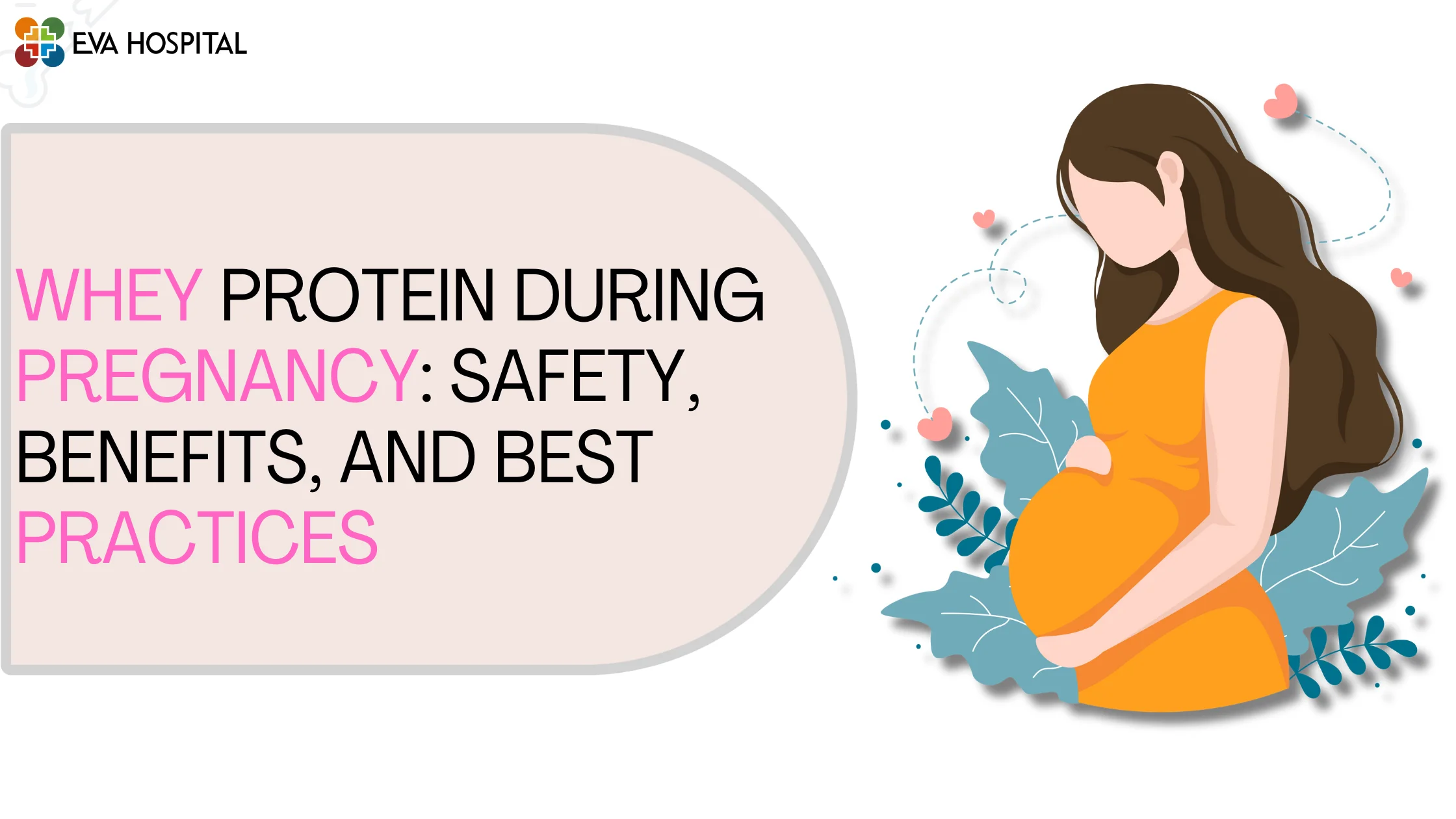Summary
The period of pregnancy is a very critical time during which nutrition becomes a critical issue to both the mother and the developing child. Protein is among the numerous nutrients that are vital in the development of the fetus, repairing tissues and making mothers strong. Most women resort to consumption of supplements such as Whey Protein During Pregnancy in order to fulfill their daily protein needs but concerns regarding safety, dosage and effect are usually raised. This paper discusses the appropriateness of whey protein, its advantages, and the safe way of selecting the most appropriate product.
Introduction
Hey everyone, Dr. Shivani Bhutani here famous gynae in Ludhiana — back with fresh insights and a big hello to all my wonderful readers! Protein is the building block of life – and it is needed by your body in greater proportions than when you are not pregnant. It not only aids in the development of your baby, but also assists in the formation of new cells as well as safeguarding the health of the mother. This is not the case because not all the expecting mothers will be able to satisfy their increased protein needs solely by diet.
That is where such supplements as Whey Protein come in the picture. The high-quality protein, which is obtained when making cheese is whey protein, and it is common with sportspeople and health promoters. However, when pregnant, the answer is: is it safe and how much you take.
Here, we are going to talk about the science, the safety and the intelligent use of whey protein by pregnant women in the detailed guide. You’ll also find expert insights, the best product types, and answers to common concerns like “Can I Eat Whey Protein During Pregnancy” and “is whey protein safe during pregnancy”.
Importance of Protein in Pregnancy
When you are pregnant, your protein intake should also rise by a large amount (around 50g of protein per day to 70-80grams per day based on the trimester and weight). Protein assists in the growth of the fetus tissues such as the brain, muscles, and body organs. It is also important in the production of the breast milk, amniotic fluid and the maternal blood volume.
Low weight of the baby at birth, fatigue, and weak immunity are the possible outcomes of protein deficiency during pregnancy. Therefore, it would be important to make sure that adequate intake is achieved either by using food or taking supplements.
Understanding Whey Protein
Whey protein is a complete protein that has all the nine essential amino acids. It is rapidly absorbed in the body and works to repair, increase energy and growth in the muscles.
In the case of Whey Protein During Pregnancy, it is necessary to pay attention to its quality, cleanness and the lack of some harmful substances. Being generally safe, a consultation with a healthcare professional before adding it to your diet will make sure that it fits your particular nutritional requirements.
1. What is Whey Protein?
Whey protein is the liquid by-product that is produced when making cheese. It is made dry and is made into a powder form, which can easily be added into shakes or smoothies. It has essential nutrients such as branched-chain amino acids (BCAA), calcium, and bioactive compounds that are effective to both the mother and the baby.
2. Types of Whey Protein
There are three main types:
- Whey Protein Concentrate (WPC): It is protein-rich (70-80) and contains healthy fats and carbohydrates.
- Whey Protein Isolate (WPI): This is a more sophisticated version containing more than 90% protein content and low lactose content, which is easy to digest.
Is Whey Protein Safe During Pregnancy?
Whey Protein During Pregnancy is safe provided that it is used correctly and it is properly selected. Not every whey supplement is equal though. Others might have added sugar, artificial sweeteners, caffeine or preservatives which might be dangerous during pregnancy.
Always select natural and third party tested and certified safe products. Additionally, one should consider taking whey protein supplementally – not to replace whole foods sources.
1. Safety Considerations
Expecting mothers should check for:
- No Artificial Additives: Do not consume proteins containing caffeine, artificial colors or artificial sweeteners such as aspartame.
- Low Sugar Content: A high level of sugar can result in gestational diabetes.
- Clean Labels: Find such certifications as GMP, NSF, or organic..
2. Doctor’s Consultation
Discuss any supplement with your physician or a registered dietitian beforehand. They are able to evaluate your nutrition, health record and allergic reactions to understand whether whey protein is appropriate to you.
Benefits of Whey Protein During Pregnancy
Whey protein supplement is quite beneficial and a well-compounded supplement has several advantages under moderation consumption. It helps in the health of both the fetus and the mother by enhancing their nutrition, energy and muscle sustenance.
1. Promotes Fetal Development
Protein is necessary in building your baby tissues, organs and muscles. The whey protein also maintains a constant intake of amino acids which also help in cellular development and repair.
2. Helps Manage Weight and Energy
Pregnant mothers have been known to experience ups and downs of fatigue and hunger. The whey protein supports the stabilization of blood sugar level and makes you feel full than usual to go longer without having unhealthy cravings.
Best Way to Consume Whey Protein
It’s not just about is whey protein good during pregnancy but also about how you consume it. Timing, quantity, and combination with other nutrients matter.
1. Ideal Dosage
The daily amount of whey protein should be one scoop (2025g), which must be adjusted with the daily intake of proteins. Excessive use can put a strain on the kidney particularly when you have underlying conditions.
2. How to Include It in Your Diet
- Add whey protein to milk, fruits, nuts and have a healthy smoothie.
- Add to pancake batter or oatmeal as a source of protein.
- Combine with Greek yogurt to make a nice snack.
Choosing the Best Protein Powder for Pregnancy Women
When there are several products of a kind, it is highly necessary to make wise choices. The best protein powder for pregnancy women must be natural, clean and contaminant tested.
1. Ingredients to Look For
- Natural Sweeteners: Choose stevia or monk fruit.
- Added Nutrients: Vitamins, minerals and probiotics to maintain good health.
- Low Fat and Carbohydrates: To prevent additional calories..
2. Brands and Certifications
Use the brands of good reputation which has passed a third party test. The products are guaranteed to be of a good quality and safe due to such certifications as ISO, FSSAI, or USDA Organic.
Alternatives to Whey Protein
Not every mother is able to tolerate dairy based whey protein particularly lactose intolerant or milk allergic mothers. Luckily, vegetarian alternatives are capable of providing the same advantages.
1. Plant-Based Protein Powders
Pea, soy and brown rice proteins are good substitutes. They are easy to digest and they offer a complete amino acid profile.
2. Natural Protein Sources
Entire foods such as eggs, lentils, beans, tofu, fish, and dairy are the most ideal sources of protein during pregnancy. The supplements are only to be used in the case of a lack of nutrients in the diet.
Risks of Overconsumption
Moderation is key. The excess protein may lead to the dehydration, excess work of the kidneys or the nutrient surplus. Moreover, there might be an absence of whole-food food because of excessive use of supplements.
1. Signs of Too Much Protein
The consequences may either be bloating, constipation, or stomach pain. One should always have a balance and include fruits, vegetables and food rich in fiber.
2. Safe Consumption Guidelines.
Reduce protein intake to 7080 grams of protein daily, including protein intake in supplements. Water is significant to ensure digestion takes place to prevent stress to the body.
FAQs
Yes, of course, but medical control at all times. In case protein dietary intake falls short, the whey protein can be used to supplement, thereby ensuring normal development of both the mother and the baby.
Yes, when chosen carefully. Use no artificial additives or sugar overload, instead use organic, low-lactose.
Yes, it contains full protein, increases energy and helps in the development of the fetus when taken in moderation..
Yes, but moderation should be taken. It is always necessary to consult your doctor to find out whether it is appropriate to take them depending on your health and nutrition condition.
Select certified and quality brands that are devoid of any preservations and artificial additives. Search in combinations with vitamins and minerals to get extra advantages.
Conclusion
Pregnancy requires the best nutrition and one of the most important elements of nutrition is protein. Supplementing with Whey Protein During Pregnancy can be a safe and effective way to meet increased protein needs — provided it’s done mindfully and under medical guidance.
Whey protein, when obtained through high quality brands and utilized properly, may help give rise to healthier pregnancies, more energy and increased fetal growth. Always keep in mind, the supplements should be used to supplement the nutrient rich diet rather than take its place. The secrets of a healthy and happy pregnancy process are balance, variety, and professional advice.



















